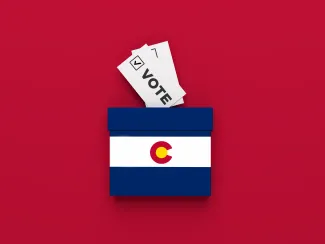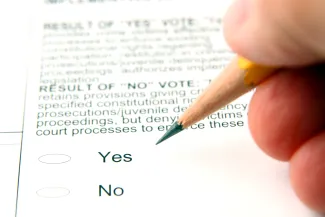
These bills on elections and democracy passed the Colorado Legislature in 2025
© fotoguy22 - iStock - 1468912821
Colorado legislators this year passed a handful of bills related to elections and democracy.
One of the bills put existing federal rights into state law in case national protections erode. Another changed how the state fills vacant General Assembly seats, which became a hot topic after three senators resigned in the period after last November’s election and the start of the legislative session.
The session, during which Democrats held large majorities in both the House of Representatives and Senate, ended last week. Here is a look at some of the key elections and democracy proposals lawmakers adopted.
The right to vote
Governor Jared Polis signed the Colorado Voting Rights Act, Senate Bill 25-1, into law earlier this week. The law codifies parts of the 1965 national voting rights law into state statute in case federal protections are stripped, either at the hands of the Trump administration or through the courts.

© Baris-Ozer - iStock-1420488382
The law clarifies the right to vote across racial and language minority groups and adds ballot translation requirements to municipal elections. A handful of cities in the state opposed the bill because of increased workload and cost. The law also bans voting qualifications based on sexual orientation, gender expression or whether a voter is in jail.
It also creates a civil right for voters to bring discrimination lawsuits against local governments for alleged voter suppression.
“Colorado’s election system is one of the very best in the country, and with this, we’re taking steps to make sure that no matter what happens at the federal level, we can make sure to protect our voter integrity here in the great state of Colorado,” Polis said before signing the bill into law.
The bill passed with entirely Democratic support.
Gun ban
Polis signed House Bill 25-1225 the same day as the Colorado Voting Rights Act. The law prohibits someone from carrying a visible gun or toy gun while doing certain election-related activities such as voting, canvassing, counting votes and helping someone else vote. Carrying a visible gun during those activities will be classified as voter intimidation.
“Those who serve as on a canvas board or serve as election judges — these are salt-of-the-Earth, dedicated positions. They require an incredible amount of time,” bill sponsor Senator Nick Hinrichsen, a Pueblo Democrat, said ahead of the bill’s signing. “When they come under threat for the work they do to preserve the freedom of our communities, our state and our country, we need to ensure that they have protections on the back end. That’s what this bill does.”
Lawmaker vacancy process
A bipartisan bill changed how vacancies in the General Assembly are filled when a lawmaker resigns or dies before the end of their term. There were five vacancy selections this year. They concerned three Senate seats, a House seat when a representative moved to one of the vacant Senate seats, and another Senate seat when a lawmaker resigned amid an ethics investigation.
Right now, a vacancy committee comprising members of the outgoing lawmaker’s party, often highly-involved party insiders, picks a replacement to serve until the next general election. That could create a scenario where a handful of people pick a legislator to serve the entirety of a term if a lawmaker resigns shortly after reelection.
This bill makes sure that somebody will represent the people of a district, but as soon as they have the opportunity to stand (for an election), then people can run against them. That's fair.
The new process creates a new vacancy election to coincide with an already-scheduled election. Vacancy committees would still immediately fill the seat, but the appointed lawmaker would then need to run to retain their seat, either that same year or the next one, depending on when the resignation happened.
The idea is that an appointed lawmaker could serve in just one session before running for reelection.
The law also increases the number of people who serve on a vacancy committee by including more precinct organizers and county commissioners of the same party that live in the district.
“This bill makes sure that somebody will represent the people of a district, but as soon as they have the opportunity to stand (for an election), then people can run against them. That’s fair. I think it strikes a good balance, and it will make sure that we have more accountability to the people of our great state,” Polis said before signing the bill on May 12.
Ballot initiative standards
House Bill 25-1327 would make changes to the citizen initiative process, in which people can bring measures to the ballot if they gather enough signatures.
“With more and more ballot initiatives being brought, we are trying to make the process easier for people to track and follow, and we are also trying to reduce some inefficiencies for agencies that are part of the title review process,” bill sponsor Senator Cathy Kipp, a Fort Collins Democrat, said during the bill’s Senate committee hearing.

© Svanblar iStock-146069215
If initiative proponents bring five or more drafts in the same cycle on the same topic, they would need to submit a chart explaining the differences between the drafts so the state’s Title Board and other interested parties can understand the distinctions between the versions.
Proponents for initiatives who earn a title, which allows them to collect signatures, would need to update the secretary of state when they reach 25 percent, 50 percent and 75 percent of their required petition signatures, and those statuses would also get posted online.
Fiscal summaries for initiatives that propose a tax increase would need to include an estimate of the maximum revenue change.
Additionally, the Title Board would be required to indicate whether an initiative would modify, extend or repeal existing law or create new law.
There are also some calendar and deadline changes for the Title Board in the bill.
The bill passed on party-line votes in both chambers, with Democrats in favor. Polis has not yet taken action on it.

















